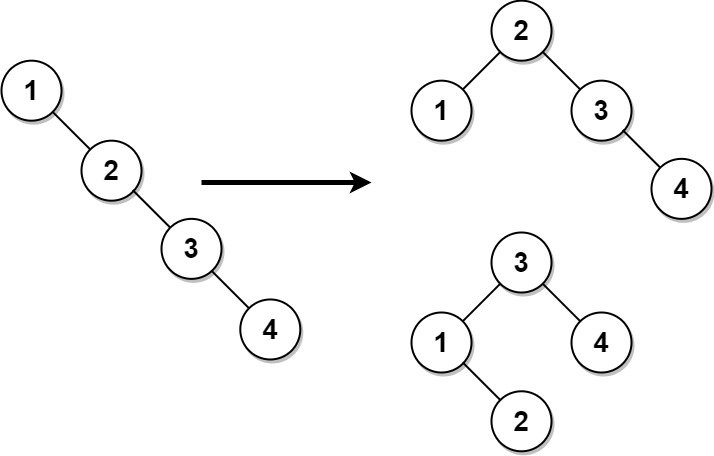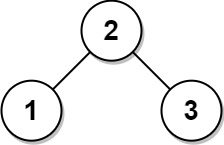
Given the root of a binary search tree, return a balanced binary search tree with the same node values. If there is more than one answer, return any of them.
A binary search tree is balanced if the depth of the two subtrees of every node never differs by more than 1.

1
2
3
4
5
| Example 1:
Input: root = [1,null,2,null,3,null,4,null,null]
Output: [2,1,3,null,null,null,4]
Explanation: This is not the only correct answer, [3,1,4,null,2] is also correct.
|

1
2
3
4
| Example 2:
Input: root = [2,1,3]
Output: [2,1,3]
|
Constraints:
- The number of nodes in the tree is in the range [1, 10^4].
- 1 <= Node.val <= 10^5
Solution Recursive#
1
2
3
4
5
6
7
8
9
10
11
12
13
14
15
16
17
18
19
20
21
22
23
24
25
26
27
28
29
30
31
32
33
34
35
36
37
38
39
40
41
42
43
44
45
46
47
| /**
* Definition for a binary tree node.
* public class TreeNode {
* int val;
* TreeNode left;
* TreeNode right;
* TreeNode() {}
* TreeNode(int val) { this.val = val; }
* TreeNode(int val, TreeNode left, TreeNode right) {
* this.val = val;
* this.left = left;
* this.right = right;
* }
* }
*/
class Solution {
public TreeNode balanceBST(TreeNode root) {
List<Integer> list = new ArrayList<>();
dfs(root, list);
int n = list.size();
return buildTree(list, 0, n - 1);
}
TreeNode buildTree(List<Integer> res, int lo, int hi) {
if (lo > hi) return null;
int mid = lo + (hi - lo) / 2;
TreeNode node = new TreeNode(res.get(mid));
node.left = buildTree(res, lo, mid - 1);
node.right = buildTree(res, mid + 1, hi);
return node;
}
void dfs(TreeNode node, List<Integer> res) {
if (node == null) return;
dfs(node.left, res);
res.add(node.val);
dfs(node.right, res);
}
}
|

